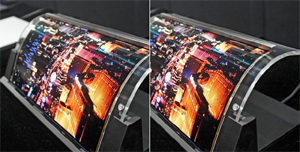



Date:08/12/17
 An affiliate of Japan Display Inc (6740.T) sold its inaugural batch of OLED screens on Tuesday, becoming the first Japanese company to commercialize an advanced technology that is currently dominated by South Korean rivals.
An affiliate of Japan Display Inc (6740.T) sold its inaugural batch of OLED screens on Tuesday, becoming the first Japanese company to commercialize an advanced technology that is currently dominated by South Korean rivals.
JOLED, which is owned 15 percent by Japan Display, shipped OLED (organic light-emitting diode) panels to Sony Corp (6758.T) for use in medical monitors, according to JOLED executives.
JOLED is the world’s first OLED maker to market screens which use a lower-cost printing process, where organic color materials are deposited onto glass substrates in a way similar to ink-jet printing.
The printing method can produce OLED screens 20 percent to 30 percent cheaper than the current evaporation process as it doesn’t need vacuum chambers and metal masks for depositing colors, Yoneharu Takubo, JOLED’s technology chief, said at a news briefing.
“We eventually want to make the printing method a de facto standard” for producing OLED panels, Takubo said.
OLED screens are gaining in popularity as they are generally thinner, more flexible and offer richer colors than liquid crystal display (LCD) panels. Apple Inc (AAPL.O) has adopted OLED screens for its new iPhone X. But high production costs are still preventing OLED screens from being used widely.
At the briefing, Takubo also confirmed that JOLED, created in 2015 by merging the OLED divisions of Sony and Panasonic Corp (6752.T), is seeking to raise 100 billion yen ($888 million) by the end of this financial year to expand production capacity.
Takubo said JOLED is in talks with several global panel producers for licensing the new production technology to make television panels. He didn’t specify the names of the panel makers.
Japanese manufacturers began investing in OLED technology in the 1990s, led by Sony and Pioneer Corp (6773.T). Most have since given up due to the high costs and defect rates, allowing Samsung Electronics Co Ltd (005930.KS) and LG Display Co Ltd (034220.KS) to take the lead.
Samsung and LG are also working on the lower-cost printing method.
Japan Display affiliate becomes nation’s first to commercially sell OLED screens
 An affiliate of Japan Display Inc (6740.T) sold its inaugural batch of OLED screens on Tuesday, becoming the first Japanese company to commercialize an advanced technology that is currently dominated by South Korean rivals.
An affiliate of Japan Display Inc (6740.T) sold its inaugural batch of OLED screens on Tuesday, becoming the first Japanese company to commercialize an advanced technology that is currently dominated by South Korean rivals.JOLED, which is owned 15 percent by Japan Display, shipped OLED (organic light-emitting diode) panels to Sony Corp (6758.T) for use in medical monitors, according to JOLED executives.
JOLED is the world’s first OLED maker to market screens which use a lower-cost printing process, where organic color materials are deposited onto glass substrates in a way similar to ink-jet printing.
The printing method can produce OLED screens 20 percent to 30 percent cheaper than the current evaporation process as it doesn’t need vacuum chambers and metal masks for depositing colors, Yoneharu Takubo, JOLED’s technology chief, said at a news briefing.
“We eventually want to make the printing method a de facto standard” for producing OLED panels, Takubo said.
OLED screens are gaining in popularity as they are generally thinner, more flexible and offer richer colors than liquid crystal display (LCD) panels. Apple Inc (AAPL.O) has adopted OLED screens for its new iPhone X. But high production costs are still preventing OLED screens from being used widely.
At the briefing, Takubo also confirmed that JOLED, created in 2015 by merging the OLED divisions of Sony and Panasonic Corp (6752.T), is seeking to raise 100 billion yen ($888 million) by the end of this financial year to expand production capacity.
Takubo said JOLED is in talks with several global panel producers for licensing the new production technology to make television panels. He didn’t specify the names of the panel makers.
Japanese manufacturers began investing in OLED technology in the 1990s, led by Sony and Pioneer Corp (6773.T). Most have since given up due to the high costs and defect rates, allowing Samsung Electronics Co Ltd (005930.KS) and LG Display Co Ltd (034220.KS) to take the lead.
Samsung and LG are also working on the lower-cost printing method.
Views: 428
©ictnews.az. All rights reserved.Similar news
- Azerbaijani project to monitor disease via mobile phones
- Innovative educational system to be improved under presidential decree
- NTRC prolongs license of two TV and radio organizations for 6 years
- Azerbaijan establishes e-registry for medicines
- Azerbaijani museum introduces e-guide
- Nar Mobile opens “Nar Dunyasi” sales and service center in Siyazan city
- International conference on custom electronic services held in Baku
- OIC secretary general to attend COMSTECH meeting in Baku
- Azerbaijan develops earthquake warning system
- New law to regulate transition to digital broadcasting in Azerbaijan
- Azerbaijani State Social Protection Fund introduces electronic digital signature
- Intellectual traffic management system in Baku to be commissioned in December
- Tax Ministry of Azerbaijan started receiving video-addresses
- World Bank recommends Azerbaijan to speed up e-service introduction in real estate
- Azerbaijan to shift to electronic registration of real estate





















